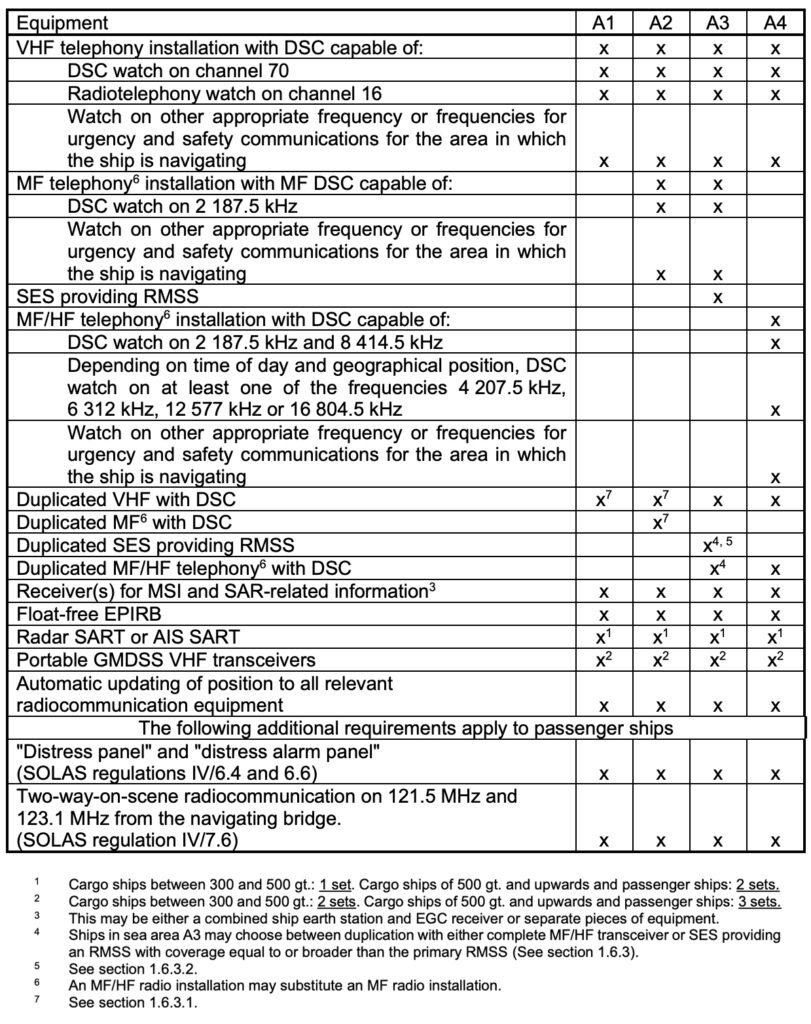The Modernized GMDSS Has Entered Into Force: What to Expect for Radio Surveys in 2024

Introduction to GMDSS Modernization
As of January 1, 2024, the Global Maritime Distress and Safety System (GMDSS) has officially entered the final stage of its modernization process. A significant set of updates to GMDSS regulations, developed over the past decade, has now taken effect. These changes impact all SOLAS vessels, with specific implications for terrestrial radio communications, marine electronics providers, and companies conducting GMDSS radio surveys on ships.
This post examines the key updates to the GMDSS regulations, focusing on what radio surveyors and maritime professionals need to know.
Key Updates to SOLAS Chapter IV on Radio Communications
The following amendments to SOLAS Chapter IV, effective January 1, 2024, are especially notable:
- Generalized Requirements for Service Providers and Technology
GMDSS technology and service providers are now defined more generically. Inmarsat no longer holds a monopoly as the only satellite provider. Iridium has been recognized since 2020, and China’s BeiDou is also seeking recognition, which could make it a third operator in the coming years. Consequently, terms like “recognized mobile satellite service” replace previous references to Inmarsat to reflect this broader context. Similarly, references to Maritime Safety Information (MSI) providers like NAVTEX and EGC have been adjusted for general applicability. - Updated Definition of Sea Area A3
The SOLAS Chapter IV revision changes the definition of sea area A3 to be any region within the coverage of a Recognized Mobile Satellite Service (RMSS) supported by a Ship Earth Station (SES) where continuous alerting is available:- For vessels using Inmarsat, sea area A3 remains the same.
- With Iridium, however, A3 now provides global coverage (effectively merging areas A3 and A4).
- For regional satellite services, A3 is restricted to the provider’s coverage area.
- Unified Radio Equipment Requirements in Chapter IV
Requirements for two-way VHF radiotelephone apparatus and search and rescue locating devices have been consolidated under Chapter IV (Radiocommunications), moving these provisions from Chapter III (Life-saving appliances and arrangements). - Mandatory Upgrade to Satellite EPIRBs for Sea Area A1
Vessels operating in sea area A1 must replace VHF EPIRBs with satellite EPIRBs for enhanced communication capabilities. - Removal of NBDP from GMDSS Equipment Requirements
Narrow Band Direct Printing (NBDP) is no longer part of GMDSS requirements. Consequently, vessels navigating in sea area A3 must now include an RMSS-SES in their GMDSS equipment. As of early 2024, Inmarsat-C and Iridium LT-3100S are available as recognized options for this purpose. - Revised Certification and Recordkeeping Requirements
From January 1, 2024, new equipment records and certificates must incorporate these regulatory amendments. Existing SOLAS certificates remain valid until they expire. - Postponement of VHF Channeling Changes Until 2028
Regulations requiring SOLAS vessel fixed VHFs to support new 4-digit channels in the maritime VHF band have been delayed to January 1, 2028. The delay is due to the current unavailability of compliant VHF radios that meet the updated standards.For full technical details, consult:- MSC.1/Circ.1676
- MSC.1/Circ.1460/Rev.4
- ITU Radio Regulations (RR) Appendix 18 (2020 Edition)
Revised Equipment and Standards Effective January 1, 2024
Several updates to equipment standards now apply to SOLAS vessels, including:
- GMDSS Tester Modernization (Refer to COMSAR.1/Circ.32/Rev.2)
- Performance Standards:
- Resolution MSC.507(105): Promulgation of maritime safety information by HF.
- Resolution MSC.508(105): Reception standards for MSI by MF (NAVTEX) and HF.
- Resolution MSC.510(105): Standards for search and rescue radar transponders.
- Resolution MSC.511(105): Standards for VHF radio installations with voice and digital selective calling capabilities.
- Resolution MSC.512(105): Standards for MF/HF radio installations.
- Resolution MSC.513(105): Standards for Inmarsat-C ship earth stations.
- Resolution MSC.515(105): Standards for survival craft portable VHF apparatus.
- Resolution MSC.516(105): Updated performance standards for GMDSS radiocommunication equipment.
- Resolution MSC.517(105): Standards for shipborne integrated communication systems (ICS) in GMDSS.

For further reference, consult Resolution MSC.496(105) for a comprehensive summary of these standards.
Summary and Implications for GMDSS Radio Surveys
In summary, GMDSS radio surveys in 2024 will primarily reflect incremental changes rather than sweeping overhauls. Key takeaways include:
- Modifications to the radio equipment composition for GMDSS surveys.
- Updated certification requirements, with broader terminology applied to service providers.
- Revised performance standards for GMDSS equipment.
With these updates, the GMDSS modernization enhances communication reliability and safety for maritime operations worldwide.


Latest Products
YDK Technologies MKN020 Gyro compass connection box
AED 3,960.0Original price was: AED 3,960.0.AED 2,850.0Current price is: AED 2,850.0.Onwa KM-8X 5-in-1 Marine Bundle Set Radome – GPS, Chartplotter, EchoSounder, AIS, Radar
8-inch GPS Chart Plotter with AIS and Radar
Onwa KM-8A (BUNDLE) 8-inch Color TFT LCD GPS Chart Plotter with Class B+ AIS Transponder MFD [BUNDLE]